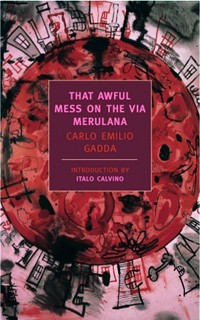
Ostensibly it is about a brace of crimes committed in an affluent Rome apartment block – a jewellery theft is followed swiftly by the murder of a woman prone to taking in waifs and strays. Enter Gadda’s taciturn detective, Ingravallo, a sensual but repressed philosopher with epicurean tendencies. So far, so Italian crime fiction cliché. In actuality That Awful Mess is far more concerned with exploring the complex swirl of seemingly unrelated motives which lead up to the murder – a murder even Gadda wasn’t certain how to solve.
Ingravallo pursues Liliana Balducci’s killer through a picturesque 1920s Rome, swimming with whores and gigolos. Gadda picks away at the bourgeois facade of the city’s upper-middle class, making darting attacks on Il Duce’s embryonic dictatorship. Liliana’s philandering husband and handsome young cousin both come under suspicion, followed by a string of girls she has taken in as proxies for the child she can’t have – a state of affairs which culminates in her trying to buy her cousin’s first born from him. There are dark undercurrents, the possible blackmail of Signor Balducci by a wenchy ‘niece’, and a violent affair between her and Liliana.
When Ingravallo’s tangled mess of an investigation leads to a semi-rural brothel with polizia clientele and a toothless enchantress, it feels as if progress is finally being made, but even as you read these grimy, atmospheric pages you know Gadda won’t deliver closure and it is unquestionably frustrating.
That Awful Mess On The Via Merulana is a shambolic book in many ways, frequently overtaken by philosophising and classical allusions which sent me to Google. However Gadda has created a potent vision of 1920s Rome, dense and teeming with life, populated with beautifully observed characters and the writing is absolutely sumptuous. The languorous pace can be challenging but if you accept it this book becomes something like the perfect Italian lunch which goes on into the evening – meandering but full of fascinating distractions, by turns erudite and bawdy and occasionally, yes, very slightly pretentious.
If you’re a fan of neatly resolved whodunits this may not be the book for you, but there is a lot to be admired here and all credit to New York Review of Books for bringing it to a wider audience.
New York Review of Books
Print
£7.19
CFL Rating: Four Stars